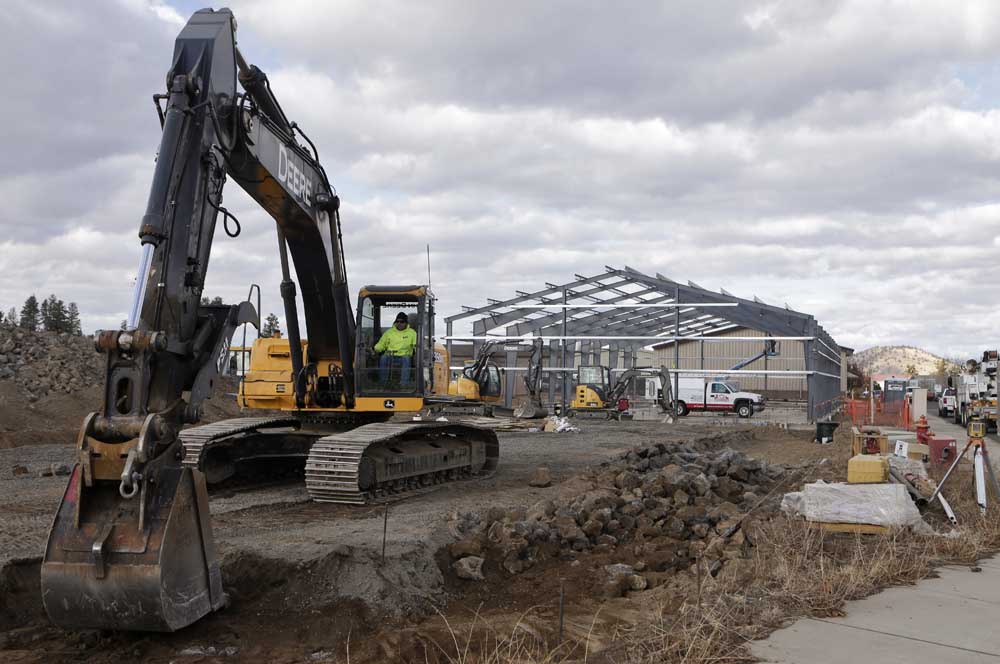Redmond industrial buildings lease up
Published 5:05 am Thursday, November 16, 2017

- Workers prepare the site of an industrial building as the framework for another goes up in Bend in November. Demand for commercial and industrial property pushed lease rates higher in 2017 and created more construction jobs. (Joe Kline/Bulletin file photo)
Moving to Redmond won’t save business owners as much money as it would have a year ago, as the vacancy rate for industrial buildings has hit a 17-year low and rents are on the rise, according to a third-quarter survey by Compass Commercial Real Estate Services.
Just 2.2 percent of Redmond’s 1.5 million square feet of industrial building space was available for lease in the quarter ended Sept. 30, according to the CompassPoints report. That’s down by more than half from a year ago, when the rate was 4.6 percent.
Trending
Redmond’s industrial market is also at its lowest vacancy rate since fourth quarter 2000, when the rate was 1.4 percent and the market consisted of less than 400,000 square feet of leasable space.
Terry O’Neil, a Compass broker who represents industrial building owners and tenants, said Redmond is in demand not only as a cheaper alternative to Bend, but as a first choice for its central location and proximity to Redmond Airport.
“Redmond is a very open-for-business city,” he said. “They’re very proactive and very welcoming.”
While rents are still about 20 percent below Bend, they’ve risen substantially, and landlords who previously did not charge for overhead costs known as “triple net” are adding that expense to their leases, O’Neil said. Triple net refers to net real estate taxes, building insurance and common area maintenance. The average advertised rate for spaces 5,000 square feet or less is 60 cents per square foot in Redmond, O’Neil said, and triple-net costs range from 17 cents to 21 cents per square foot, both in Redmond and Bend.
The International Brotherhood of Electrical Workers Local 280, based in Tangent, recently leased about 5,200 square feet on SW 21st Street in Redmond for a training center. Business Manager Drew Lindsey said he was surprised by how difficult it was to find the right space.
“To me, there wasn’t enough things there to rent at a price we could afford. It was a long process with the trustees,” he said.
Trending
The lease rate is 55 cents per square foot, so with triple net expenses the electricians’ training center will cost almost $3,800 per month. “The money comes directly out of my members’ pockets,” Lindsey said.
The union plans to combine its Central Oregon hall and dispatch center with the new training space, which is needed to keep up with demand for labor, he said. “In the long run it’s going to serve the industry.”
O’Neil thinks the Redmond market is tight enough to justify speculative development and said some industrial property owners are considering it. That probably won’t happen in Bend, said Dan Steelhammer, an industrial broker with Fratzke Commercial Real Estate. The cost of development and construction is so high, rents would have to be $1.30 per square foot to justify the investment, he said.
Rents in Bend already are so high that some business owners are shying away, he said. “They’re going back to their garages. They’re going to Prineville, they’re going to Redmond. They’re going to Madras.”
The third-quarter vacancy rate in Bend was 3.6 percent of about 4.3 million square feet, according to the Compass report.
Demand in Bend is still strong enough that American Lane Investors, which owns an industrial park on the east side of Bend, is working on two more buildings and expects to start three more in the spring, said Shawn Teevin, a partner in the development. Teevin said his partnership is fortunate in that it prepared the land for development a decade ago, so all that’s left is to put up buildings. The park offers small spaces, 1,800 square feet to 2,200 square feet, for boutique businesses, everything from building materials to food distributors.
The rent is about 70 cents per square foot, plus triple net expenses, Steelhammer said.
“Hopefully they’re able to generate enough sales to cover that rent,” he said. “That’s kind of the reality of our market. Much like affordable housing, it’s tough right now.”
—Reporter: 541-617-7860, kmclaughlin@bendbulletin.com








